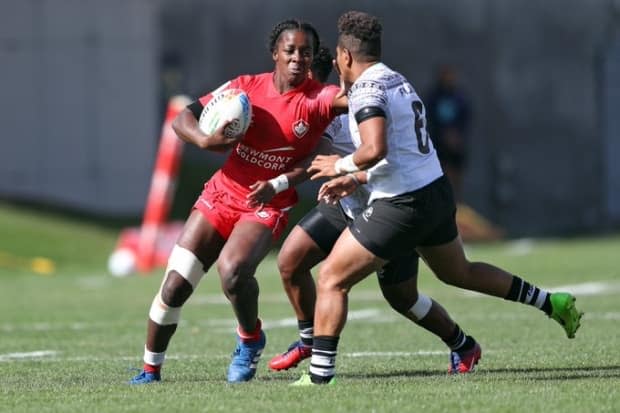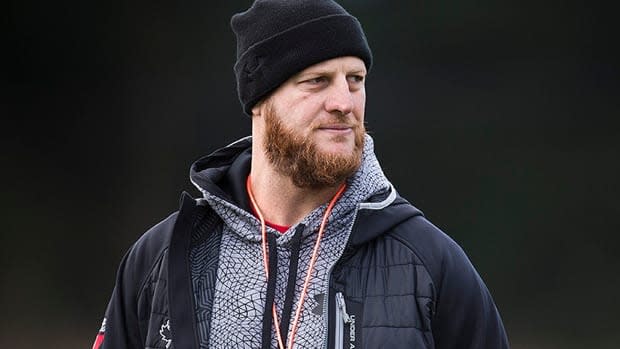Departure of Canadian rugby 7s coach a 'symptom of a bigger issue,' says player Buisa

Canadian rugby sevens player Pamphinette Buisa says the recent resignation of head coach John Tait is merely a reflection of a rotten organizational culture.
Buisa, 24, was among 37 current and former players who filed a complaint to Rugby Canada in January, which ultimately led to Tait's departure. An independent review found that the complaint did not fall within the organization's bullying and harassment policy.
"The reason why we came forward was not to just have someone leave. That would miss the entire point. The point was to stand up and to show that this is a bigger issue. That someone leaving is a symptom of a bigger issue," Buisa said in an interview with CBC Sports on Wednesday.
"It's understanding that when one person says something and when two people said something and more and more of us come together and stand together, then things happen."
Buisa says it wasn't just one incident that led to the complaint, but instead a series of smaller instances amid an overly competitive environment that made the team speak out.
Buisa has been a member of the centralized sevens program since 2014, where the team is based out of the Lekwungen Territory in Langford, B.C. In that time, she's progressed from a developmental player to a staple of Canadian teams on the World Rugby Sevens Series.
As such, she's witnessed firsthand how an athlete can evolve from being unwilling to come forward with issues in fear of being denied a place on the team to being unwilling to come forward in fear of losing her place.
"As I made my way on the team, I became more and more, maybe even complicit to that silence and not saying something when things were happening. … If you're benefiting of the system of a culture, then it's sometimes hard to realize how you play a role," Buisa said.

Tait recently released a statement denying any abusive behaviour on his part.
"It is shameful and beyond misleading for these athletes to be portraying themselves as victims in regards to how I or the program treated them," he said.
The independent review, conducted by Win Win HR Solutions Inc., acknowledged that the complaint reflected the experience of the athletes.
In a statement to CBC Sports on Wednesday, Rugby Canada said the independent review, set to begin after the Olympics, will help the organization understand the voice of its members.
"We are committed to supporting the athletes both in their preparations for the Summer Olympics and in undertaking an independent review of our performance rugby programs to help us understand the journey and experiences of our athletes and staff involved with our National Teams," the statement said.
Tait also called for the review to be made public.
"My question to that is what would that do?" Buisa said. "Would that then overthrow the idea that safe sport shouldn't be a conversation? Would that then further undermine the importance of bullying and harassment?"
Reflection amid pandemic pause
When sports came to a halt and the Olympics were postponed amid the COVID-19 pandemic in 2020, it was the first time the sevens team was able to assess its experience from a distance.
The result it found was that many of its current players, as well as some retired ones, were not happy.
"I think it was through the pandemic, through realizing that when we talk about social distancing and bridging the gap, that there was too much distance, we were in isolation and there wasn't enough opportunities and time to be relational with one another," Buisa said.
By coming together and asking simple questions like 'Are you OK?', Buisa said teammates could share their experiences more freely, eventually leading to the formal complaint.
"This is not about blaming something on one person. It's understanding that safe sport is about how we can feel safe, how we can show up and play. And even if it's a competitive environment and even if it's high performance, that it shouldn't be about putting ourselves through tremendous amounts of harm," Buisa said.
Players seek improved culture
Buisa said she's hoping policies are changed to make it easier for athletes to come forward, while adding a level of accountability for those in power. Tait previously held the roles of head coach and high-performance director, meaning he technically reported to himself.
"We already had a policy picking holes at what our experiences [were] like, we already had people of power being like, 'That didn't happen, that's not true,' and minimizing, gaslighting our experiences," Buisa said.
She added that any changes made should be trauma-informed. That approach takes into account a person's entire life when handling a situation in order to formulate the most effective solution.
The Canadian women's rugby sevens team won bronze at the 2016 Olympics and is currently ranked third worldwide.
But even with the Tokyo Games less than three months away, the goal for Buisa's team is much greater than the top of the podium.
"It's about how we can create safe sport, not about what do we do from here and the controversy around that. It's really clear. It's really simple. Let's just be better for each other so that we can play sports, excel and do well."

 Yahoo Sports
Yahoo Sports 